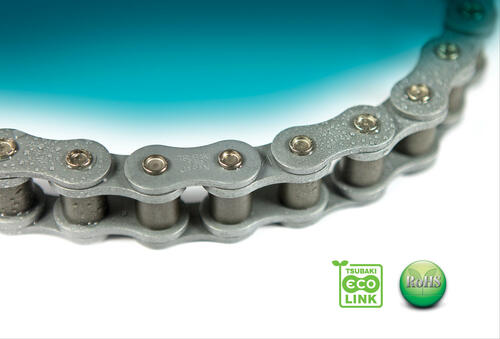Tsubaki takes an eco-friendly approach to product design
With a new approach to product design and development, Tsubaki is helping customers address the key challenges of the 21st Century; reducing the environmental burden of their operations and improving economic efficiency.

Products developed as part of Tsubaki's Eco & Eco philosophy (Ecology and Economy) promise to reduce environmental burden for customers by promoting increased efficiency, improved resource recycling and increased reuse potential. They also help to reduce running costs through long wear life and maintenance-free operation; and by being inherently simpler products, they can also help to reduce procurement costs.
Tsubaki has a long-standing reputation for developing high quality, high performance lubricant-free chain products, which offer extended operational life and reduced maintenance costs. Over the years, Tsubaki instituted a policy that all products it develops must be environmentally friendly. This meant products that would save energy, reduce CO2 emissions, eliminate lubrication for a cleaner workplace, reduce waste, ensure long life, reduce noise, enable reuse, and eliminate the use of harmful materials and substances. Now the company has formalised these joint development goals into the Eco & Eco range.
Sales & Marketing Director for Tsubakimoto Europe B.V., Jake Yamamoto comments: "The entire Tsubaki Group has been working together for some time to ensure that all new product developments are environmentally-friendly. We have looked at the ecological factors that we can directly control, and classified them into seven categories: resource conservation, with a reduction in waste; energy saving, with reduced CO2 emissions; clean workplace and usage environments; consideration for the surrounding environment; ease of disposal; reuse; and consideration for harmful substances.
"By using these categories as a framework for all new product design and development, and combining these environmentally-friendly benefits with the proven economic advantages of Tsubaki products, we are delivering on our commitment to help customers reduce the economic burden of their operations and improve economic efficiency."
The small size, low weight, lube-free design and long wear life of the Tsubaki chain products, combined with reduced weight, elimination of residue and ability to recycle aids in the conservation of resources. In addition, the low friction and high efficiency help to reduce energy consumption, thus lowering energy costs and reducing CO2 emissions. By running lube-free, and with minimal dust, the chains help to ensure a cleaner working environment.
Consideration for the surrounding environment comes by minimising all forms of pollution, including lubricant, noise, vibration and odour. Use of a rationalised, simpler range of materials in the manufacture of the products promotes ease of disassembly and disposal, and many of the materials can be reused. Tsubaki has also worked to eliminate harmful substances, many in line with customer requests, and instead has promoted the use of safe materials such as edible grease.
Eco & Eco products are already available in the full range of Tsubaki chains, including GT4 Winner, Lambda lube free chain, Neptune™ corrosion resistant chain and G8 Heavy Duty chain. New additions to the Tsubaki range will also be Eco & Eco products. Users can expect to achieve double the wear life of traditional products, with up to 49% reduction in CO2 emissions.
In addition to the ecological benefits for users, the economic benefits are also clear: the increased wear life means a reduction in maintenance time and effort, and the elimination of regular chain switching costs. In addition, the chain products deliver significantly increased performance, which means users can reduce chain size for a given application, lowering product costs and reducing overall equipment size.
Demonstrating the potential of its Eco & Eco range, Tsubaki presented a brewery project where 18 conveyors were being used to transport pallets of barrels. Each conveyor ran for 9.75m, with a 7.5kW electric motor driving a 3-strand chain at 15m/min. But chain lubricant splashing onto the pallets and barrels was resulting in defects, contamination problems and rejects. The customer tried to solve the problem by stopping lubricating the chain, but after a few months running, the chain became stiff and the rollers showed a flat surface. Vibration increased significantly, and the motor started getting very hot, resulting in constant thermal tripping.
Tsubaki recommended a lubrication-free alternative, using a 2-strand bearing roller chain. The rollers are completely maintenance-free and, because of the lower friction, the customer was also able to use a smaller power motor - just 1.5kW. The end result was that energy consumption was reduced from 27,000kWh to just 5,400kWh. This both lowered the energy costs and meant a CO2 reduction from 15,255kg to 3,056kg.
There was a significant equipment cost saving as well, both from the 2-strand chain meaning fewer chain meters and from the significantly smaller electric motor. With no need for lubrication, there were additional maintenance savings, while the long-life design of the chain meant an operating life increase from just 4 years promised by the existing product to approximately 15 years for the Tsubaki chain.
"At Tsubaki we are mindful of the environment in all of our operations and recognise that we have a responsibility to develop products which are more environmentally friendly," Yamamoto concludes. "This is a key driver for new product development. But at the same time, we see that our customers are also facing environmental pressures, and therefore our own ecological design principles can offer direct customer benefits too. By combining this with the longstanding, proven economic advantages of Tsubaki chains, these Eco & Eco products really can help our customers to reduce the environmental burdens of their operations and at the same time improve their economic efficiency."
